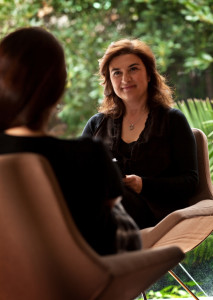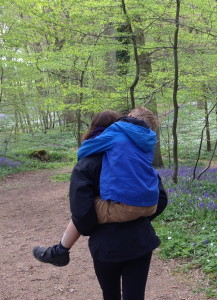Some of us have children who behave in ways that would leave any parent feeling inadequate, powerless and utterly helpless.
As a result of a daily diet of defiance, provocation, and maybe even assault, we can become so possessed with feelings, that there is no meditation, mantra, centering, breathing, or self acceptance practice that can anchor us to a peaceful body and mind.
It’s a fact of life, that no matter how secure and well resourced we are, or have felt in the past, if our capacity for resilience, courage and self care is insufficient for the particular slings and arrows (or kicks and punches) being thrown at us in the present, we will be hurled out of our window of tolerance, and our ability to remain compassionately present to ourselves and our children is compromised.
After all, it’s not as if we can easily discharge all that survival energy storming through our systems, by fighting back, or fleeing the source of the distress (as much as we might really, really want to). We have to stay with it, and face it, and take it. With little respite, and no guaranteed get out clause, for what may well be a lifetime.
It’s no wonder we eventually get burnt.
We all have a limit. All the effort, the experience, the learning, the self-development over the years may have widened that window by a mile, but there is still a limit.
And that’s okay. As psychologist and Buddhist teacher Tara Brach, wisely reminds us,
“Staying present to difficult emotions is not an endurance test. It is not yet another domain where you need to prove that you can succeed”.
Not that you’d ever know it, judging by our reactions. When we’ve crossed over the tolerance border, we can act in very hurtful ways towards ourselves, if not our children. We tumble into self-criticism and toxic shame, which only floods us with more cortisol, keeps our amygdalae on high alert, and reinforces our perception of helplessness.
We are not to blame for our struggle. We are following a natural process. We are conditioned to contract from pain.
When we are overwhelmed, we can move into a kind of protective shock. We withdraw from our bodies, from opening, from sensing, from feeling, in order to avoid the distress that threatens to annihilate us.
It’s a refuge, of sorts. And sometimes it’s a relief to hang out in that space a short time, whilst we recover our internal resources, come back to bodies, and return to stability and resilience.
 But sometimes we cannot get out of this alone. When we are feeling this fragile, we need to anchor ourselves to a powerful, external resource.
But sometimes we cannot get out of this alone. When we are feeling this fragile, we need to anchor ourselves to a powerful, external resource.
We need the visceral, relational, experience of being held by a caring community of human allies; the inspirers, protectors, and connectors that can shield us from relationship trauma, and can also help us recover from it.
Because, as research continues to reveal, wounds which occur in the context of relationship can only be healed in the context of relationship.
Regulation is relationship dependent. We are designed for co-regulation, it’s from this platform we build our capacity for self-regulation.
When we experience the felt sense of another’s care and protection, we have a secure base from which we can find our way back to our bodies and to sensing ourselves. We can become the source of our own safety and comfort again. And we can truly care for our children once more, becoming the inspiration, the protector, the compassionate ally they need us to be.
Sarah Peyton, from empathybrain.com, says
“With complex events, we need to be held over and over again, from many angles and by many people.”
Imagine what a whole tribe of healthy relationships would do for us!
But we need to choose our allies well. Not all are created equal…
We need allies who are truly supportive of us and our relationship with our child, who hold, on our behalf, the possibility for healing, no matter how messy it all seems right now. Who don’t try to fix, deny, minimize or avoid our experience, but simply accompany us, wherever we are at.
Who can tell us, “I see you, I hear, you, I get you.” And they do.
 We need allies strong enough to take our weight as we navigate the fire. Stable enough so we can hitch-hike on the back of their calm and steady presence, until our own nervous system remembers how to organise towards integration and peace.
We need allies strong enough to take our weight as we navigate the fire. Stable enough so we can hitch-hike on the back of their calm and steady presence, until our own nervous system remembers how to organise towards integration and peace.
Our allies don’t have to be sourced from our family and intimate relationships. In fact, they rarely are. They are more often therapists, mentors, coaches, trusted advisors, teachers, support groups, priests, social workers, community health workers. What they have in common, is that they can offer constancy (vital), attunement, and unconditional regard.
It’s crucial to note here that reaching out and seeking help, and allowing ourselves to really receive it, is not an easy task for everyone. It takes courage, because it can feel vulnerable, and scary. In the next few posts I will explain why. This so often ignored, which is why we stay stuck.
For our children’s sake we must take the risk, because when there is a lot of high activation thrown our way, we need to protect our nervous systems like we would a precious Stradivarious. And that includes caretaking our capacity for resonant, compassionate connection and secure attachment, so we can remain effective emotional stewards for our children.
We must prepare the ground during peacetime, before crisis hits. Consider making a commitment today, to grow your ‘tribe around the family’, with relationally-oriented allies in abundance.
Take a moment today to reflect on the tribe that helps YOU hold up your family.
What shape is it currently in, if it exists at all?
What would it look like if you had all the support you need?
What specific Allies do you need to meet your emotional nourishment needs, especially when you are under pressure?
What requests do you need to make to your community so you can fill that gap?
What kind of promises do you need to make to yourself, so you can fulfil on your commitment to grow your tribe?
What is the one small action you can take today, to start making it happen?
You may notice discomfort, a resistance, a contraction, maybe a little anxiety arising in your body as you reflect on questions about requesting and receiving support. If this is the case for you, you may find the next series of posts relevant for you.

Recent Comments